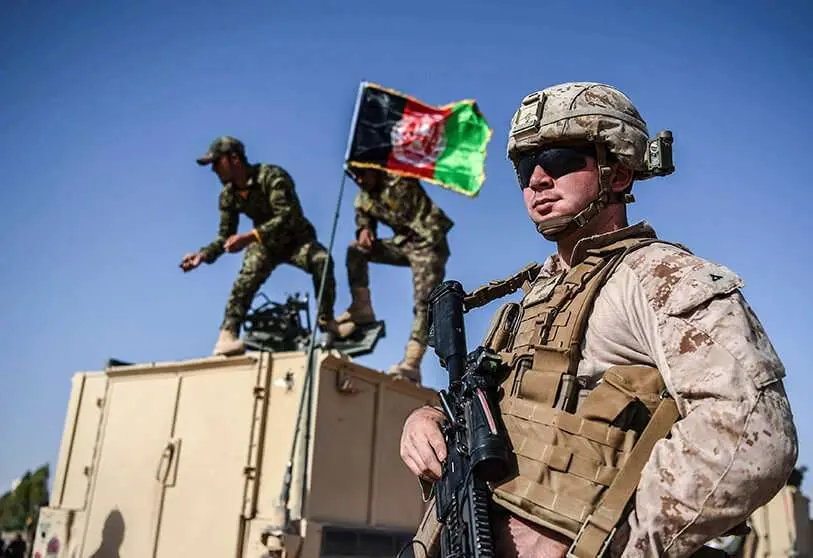Between a rock and a hard place

The war in Afghanistan is the longest war in the history of the United States as it will be 30 years old in 2021, just like the one in which the Spanish Tercios were involved and which marked the beginning of the end of the Spanish empire in Europe. But that one, which also lasted 30 years, ended with the Treaty of Westphalia in 1648, whereas it is unknown how the war in Afghanistan will end. Unlike the Iraq war, which many rejected, the war in Afghanistan was popular in the US and imposed due to the safe haven Al-Qaeda had there after the 2001 terrorist attacks on the Twin Towers and the Pentagon. However, popular support for the war then does not mean that it remains popular now after many dead on both sides (many more among the Afghans), many maimed, and three trillion dollars spent. The Americans do not understand what their soldiers are still doing there because they already know that it is an unwinnable war and accomplished its goal with Osama bin Laden's death. That is why Biden has made no secret from the outset of his desire to repatriate once and for all the 3,500 soldiers he still has in Afghanistan. In his memoirs, Obama recounts that even during his presidency Biden wanted to put an end to this war.
The problem is that this is not easy, and that is what the Americans and Taliban have been talking about for months in Doha. Afghans fearful of the future, Americans eager to forget this nightmare and Taliban who feel they have already won have met there, in a context marked by Donald Trump's commitment to withdraw all his troops from Afghanistan on May 1. And it is not easy because the three options Washington is considering have drawbacks, and whatever Biden does, he will end up losing a lot in the process.
The first option is to leave Afghanistan on May 1, fulfilling the commitment made by Trump a year ago to the Taliban in exchange for a cessation of attacks on his troops.This is what the Taliban are demanding, and during this time they have conquered a lot of territory and concentrated their attacks on demoralised government troops. But if the US withdraws on May 1 without an agreement, 30 years of effort will be wasted, the government in Kabul will collapse and the Taliban will take over the country and impose a medieval emirate based on Islamic law with a serious setback for human rights, especially women's rights. Where the Taliban rule today, no mobile phones, music or schooling for girls are allowed, while the more remote areas remain in the hands of feudal lords as ever.
The second option is not to comply with Trump's agreement and keep troops in Afghanistan until the Taliban agree to share power with the government in Kabul, something they reject because they consider President Ghani to be a Washington puppet. And they are right. This seems to be the preferred option for Pentagon military officials reluctant to leave a job they feel is incomplete and needs additional time. They also believe that imposing a date for withdrawal undermines any negotiating position. This argument was successfully used against Obama in 2009. This means a mission with no foreseeable time limit.
The third option would be to delay the withdrawal for a few months to see if, in the meantime and against all logical hope, Ghani and the Taliban can be brought to a power-sharing agreement and to some compromises on human rights. This option will not satisfy the Taliban either, because it takes time away from the victory they were already counting on. In either second or third option, the Taliban will resume their attacks on American soldiers.
After much thought, Biden has opted for the third option and has just announced that the 3,500 troops still in Afghanistan will leave on September 11, a symbolic date as it is the 20th anniversary of the terrorist attacks on the Twin Towers and the Pentagon. By delaying the departure beyond the date Trump has committed to, Biden is taking a risk, but by setting another date only four months later he hopes to prevent the Taliban from attacking his soldiers. To do so, he is still counting on the 7,000 Taliban prisoners that the Kabul government has so far resisted releasing. It is all a matter of a little arm-twisting. Biden must now communicate his plans to his NATO allies, who also have troops in Afghanistan, to coordinate their withdrawal plans, while his diplomats make a last-ditch effort to bring the Taliban closer to the Kabul government.
Who knows what is to happen in Afghanistan after September 11. Most likely, fighting will intensify between the government and the Taliban and the latter will bear the brunt in a world that will return to the tribalism of the warlords, thus ending the mirage of the centralised state that the Americans have sought to create in a landscape and with a people who have not emerged from the Middle Ages. And I fear that the burqa will once again be the sad fate that awaits women. I hope I am wrong.



